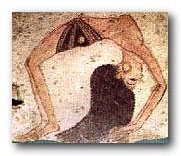|
The
Ancient Egyptian Concept of the Soul
The
multiplicity of Egyptian thought is so different from
the traditional view of western thought that it can be
hard to imagine.
The dead man is at one and the same time in heaven, in
the god's boat [Re, the sun-god's, celestial barge], under
the earth, [tilling the Elysian fields], and in his tomb
enjoying his victuals. - Lionel Casson, Ancient Egypt
-- J. J. Poortman, Vehicles of Consciousness - the Concept
of Hylic Pluralism
In
Egypt one person could have multiple afterlives. Each
different part of the person would be able to have
its own existence after death, if they survived the
trials of the underworld and the Osirian judgement
of the dead with all of their magic spells.
|
|
While
the Khat lies in the tomb, ready to be animated by the
Ka, the Ba might be travelling the underworld with Ra.
While the Ab is with the gods, the Khaibit might be with
the Ba on the barque or in the tomb eating some offerings.
At the same time, the Akhu, Sekhem and Sahu might be contentedly
living in the stars, looking down at the earth.
An
interesting point to note is that the Egyptians believed
that animals, plants, water and even stones had their
own Ka. A human's Ka could move around while a person
slept, and even inhabit a plant if the Ka so desired,
rather than the human body. The Ka could manifest itself,
as a ghost, to others, both when the person it was 'born'
with was dead or alive. It was even thought to haunt those
who did wrong to it - if family failed to make proper
offerings, the starving and thirsty Ka would haunt them
until they corrected their error!
|
|
The
Egyptians mummified their bodies because their physical
form was an integral part of their afterlife. Being
such a practical people, enjoying what they could
see and touch, an existence without a physical body
was unacceptable to them. |
|

|
Even the destruction of the heart (the spiritual Ab rather
than the physical heart) would mean the death of all of the
other parts of the being, but it meant that the physical heart
was preserved along with the physical body. Other rituals
point to the importance of the physical body after death -
the Opening of the Mouth ceremony allowed the body to breath,
while other rituals were performed on the corpse to allow
the deceased to see and hear in the Land of the West.
Death
was a complex affair. Originally this was only for the pharaoh,
but the rich soon believed that they could take part in the
afterlife, and eventually the poor believed they could join
the ranks of the blessed dead. Other reasons for the complexity
of life after death came from the Egyptian way of clinging
to ideas, rather than discarding them when new ideas came
along. The intermingling of peoples, the different religious
ideas and cults all were incorporated into the Egyptian beliefs,
giving rise to this elaborate belief system.
|
From
the monuments and papyrus scrolls and tombs left today,
it's no wonder that Egyptians were thought to have focused
their lives around death! But the Egyptians, like any
other people, enjoyed life, and did not look forward
to death.
|
 |
They
followed the maxim "live life not that thou shalt die"
- partying and generally trying to enjoy life. But death,
to the Egyptians, was a somewhat better version of their current
life. They would eat, drink and share good companionship in
the stars or in the Land of the West. They would have servants
to do their chores for them. Life, after death, would be ideal.
The only problem was that there was no guarantee that they
would actually get to the afterlife, and there was always
the threat of their names, physical bodies or images being
destroyed, killing their multiple parts in the process. Spells,
prayers, tomb paintings and statues could help, but if everything
was obliterated, then they died, too.
No wonder the Egyptians lived their lives to the fullest
|
|